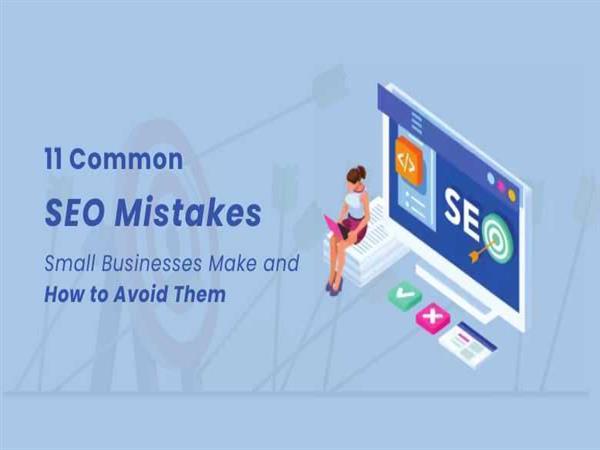As a small business owner, you may have heard about the importance of search engine optimization (SEO) for your website. With over 3.5 billion searches conducted on Google every day, it's crucial to ensure that your website appears at the top of search results when potential customers search for keywords related to your business.
However, many small businesses make common SEO mistakes that can hurt their search engine rankings and hinder their online visibility.
In this blog post, we'll discuss 11 common SEO mistakes that small businesses make and how to avoid them.
By avoiding these mistakes, you can improve your website's search engine rankings, attract more customers, and establish a strong online presence for your business.
Keyword Research Mistakes:
One of the most important aspects of SEO is keyword research. Many small businesses make the mistake of not conducting proper keyword research or not using the right keywords.
For example, using highly competitive keywords that are difficult to rank for or not using long-tail keywords can lead to poor search engine rankings.
To avoid these mistakes, small businesses should use keyword research tools and analyze competitor keywords to find less competitive but relevant long-tail keywords.
Poor On-Page Optimization:
On-page optimization is the process of optimizing web pages to rank higher in search engine results.
However, many small businesses neglect on-page optimization, which can hurt their SEO efforts. Some common mistakes include not using header tags, neglecting meta descriptions, and not optimizing for user experience.
To avoid these mistakes, small businesses should conduct regular website audits, optimize for user experience, and make sure all on-page elements are optimized.
Lack of High-Quality Content:
Content is one of the most critical components of SEO. However, many small businesses make the mistake of not creating original and high-quality content. For example, they may copy content from other websites or neglect to update their content regularly. This can lead to poor search engine rankings and a lack of engagement from website visitors. To avoid these mistakes, small businesses should create a content strategy, focus on creating high-quality, informative content, and update their content regularly.
Neglecting Local SEO:
Local SEO is critical for small businesses that want to attract customers in their local area. However, many small businesses neglect local SEO, which can lead to poor visibility in local search results.
Common mistakes include not optimizing for local keywords, not having a Google My Business profile, and not getting listed in local directories.
To avoid these mistakes, small businesses should optimize for local keywords, create a Google My Business profile, and get listed in local directories.
Overlooking Technical SEO:
Technical SEO refers to the process of optimizing a website's technical aspects for search engine crawling and indexing. However, many small businesses overlook technical SEO, which can lead to poor search engine rankings.
Some common technical SEO mistakes include having broken links, not optimizing website speed, and not using proper schema markup.
To avoid these mistakes, small businesses should conduct regular website audits, optimize website speed, and use proper schema markup.
Ignoring Link Building:
Link building is an important aspect of SEO, as it helps establish authority and credibility for a website.
However, many small businesses make the mistake of not diversifying anchor text or buying links, which can hurt their SEO efforts. To avoid these mistakes, small businesses should focus on building natural, high-quality links, diversify anchor text, and avoid buying links.
Neglecting Analytics and Tracking:
Tracking and analytics are critical for measuring the success of SEO efforts. However, many small businesses make the mistake of not setting up Google Analytics or not tracking website traffic regularly.
This can make it difficult to measure the success of SEO efforts and make necessary improvements. To avoid these mistakes, small businesses should set up Google Analytics, regularly track website traffic and user behavior, and make data-driven decisions.
Not Optimizing for Mobile:
Mobile optimization is essential for small businesses, as more and more people use mobile devices to access the internet.
However, many small businesses make the mistake of not optimizing their website for mobile, which can lead to a poor user experience and hurt their search engine rankings.
To avoid this mistake, small businesses should make sure their website is responsive and optimized for mobile devices. They can also use Google's mobile-friendly test to check their website's mobile-friendliness.
Ignoring Social Media:
Social media can be a powerful tool for promoting a small business and driving traffic to their website.
However, many small businesses make the mistake of not using social media or not using it effectively.
For example, they may not post regularly, neglect to engage with their followers, or not share their website content on social media.
To avoid these mistakes, small businesses should create a social media strategy, post regularly, engage with followers, and share their website content on social media.
Neglecting Local Listings:
Local listings are important for small businesses, as they can help them get found by customers who are searching for local businesses online.
However, many small businesses make the mistake of not claiming their local listings or not keeping them up-to-date.
To avoid these mistakes, small businesses should claim their local listings on platforms like Google Business Profile, Yelp, and TripAdvisor, and keep them up-to-date with accurate information.
Not Monitoring Backlinks:
Backlinks are important for SEO, but not all backlinks are created equal. Many small businesses make the mistake of not monitoring their backlinks or not removing low-quality backlinks. This can hurt their search engine rankings and even result in a penalty from Google.
To avoid these mistakes, small businesses should monitor their backlinks regularly, disavow low-quality backlinks, and focus on building high-quality backlinks.
Conclusion:
In conclusion, small businesses need to pay attention to their SEO strategy if they want to succeed in the digital landscape. By avoiding the 11 common SEO mistakes we discussed in this blog post, small businesses can improve their search engine rankings, attract more customers, and establish a strong online presence.
It's important to note that SEO mistakes can have a significant impact on small businesses' marketing efforts. Poor SEO practices can lead to a decrease in website traffic, a decrease in lead generation, and ultimately, a decrease in revenue.
To avoid these negative consequences, small businesses may want to consider working with an SEO marketing agency. An agency can help small businesses develop and execute a comprehensive SEO strategy, conduct regular website audits, and stay up-to-date on the latest SEO trends and algorithm updates. By partnering with an agency, small businesses can focus on running their business while leaving the SEO work to the experts.
In summary, small businesses should prioritize their SEO efforts to improve their online visibility and drive more traffic to their website. By avoiding common SEO mistakes and working with an SEO marketing agency, small businesses can achieve their marketing goals and thrive in the digital landscape.
By avoiding these mistakes, small businesses can improve their search engine rankings, attract more customers, and establish a strong online presence.




Leave Comment